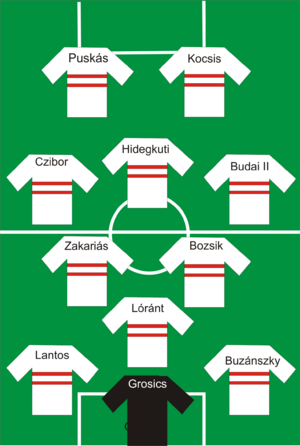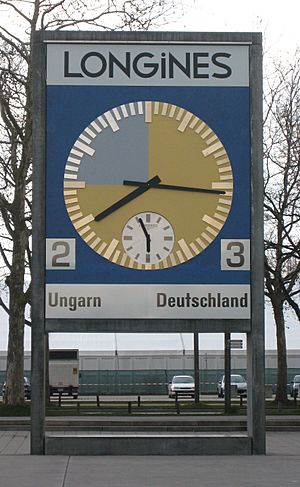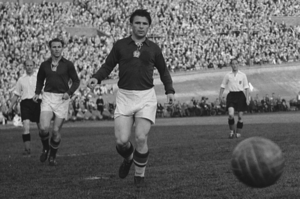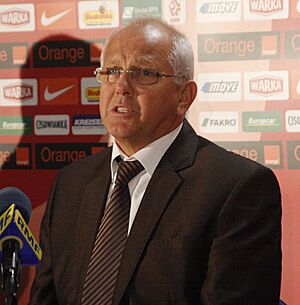History of the Hungary national football team facts for kids
The history of the Hungary national football team is a long and exciting one, starting way back in 1912. This team has seen many ups and downs, from amazing victories to tough losses, and has featured some of the world's best players.
Contents
- Early Days of Hungarian Football
- The Golden Team of the 1950s
- The 1960s: More Olympic Success
- The 1970s: A Decline Begins
- The 1980s: Last World Cup Appearances
- The 1990s: Tough Times
- The 2000s: Searching for Success
- The 2010s: A Return to the Euros
- The 2020s: Strong Performances and New Hopes
- Images for kids
Early Days of Hungarian Football
Even though Austria and Hungary were part of the same big empire (the Austro-Hungarian Empire), they decided to have their own separate football teams and groups (called football associations) around the early 1900s.
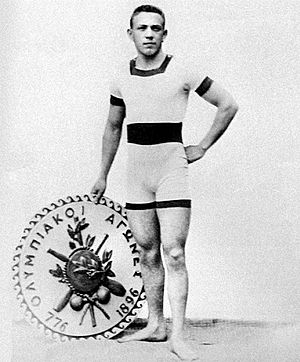
First Olympic Games Appearance (1912)
The Hungarian national football team first played at the Summer Olympic Games in 1912 in Stockholm, Sweden. It was so hard for them to go that they even had to ask people for money to pay for the trip! In their first game, Hungary played against England and lost 7–0, which meant they were out of the tournament.
After the Olympics, Hungary played two matches against Russia in Moscow. They won the first game 9–0 and the second an incredible 12–0! This 12–0 win is still a record for the team. A player named Imre Schlosser scored seven goals in those two matches.
Then, World War I started, which made things very difficult for Hungarian football. The country faced money problems, and so did the football clubs. During the war, Hungary played against Austria 16 times. After the war, some countries tried to stop Hungary from being part of FIFA, the world football organization. But FIFA said no, and because of that, some British and Irish football groups actually left FIFA for a while!
The 1920s: New Formations and Big Wins
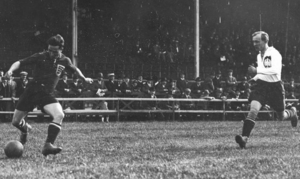
In 1920, the Olympic Games were held in Belgium, and countries that were part of the "Central Powers" (like Hungary) were not allowed to compete. During this time, two brothers, József Fogl and Károly Fogl, played for the national team. Hungary used a special playing style called 2–3–5, which was quite unique back then.
In 1924, the team played at the Summer Olympics in Paris, France. They beat Poland in their first game but then lost to Egypt in the next round. Because of this loss, both the coach and the head of the Hungarian Football Federation (the main football organization) quit their jobs.
Between 1927 and 1930, Hungary took part in the Europa Cup, which was one of the first international football tournaments. On 12 June 1927, Hungary had another record-breaking win, beating France by 13–1! A player named József Takács scored six goals in that amazing game.
The 1930s: World Cup Debuts
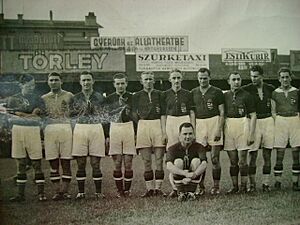
The very first FIFA World Cup was held in Uruguay in 1930, but Hungary didn't play because they weren't invited, and there were no qualification games back then. So, Hungary's first World Cup appearance was in Italy in 1934.
Hungary's first World Cup match was on 27 May 1934, against Egypt. They won 4–2! Goals were scored by Teleki, Toldi (who scored two), and Vincze. In the next round, the quarter-finals, Hungary played against their neighbors and rivals, Austria, and lost 2–1.
In the 1938 FIFA World Cup in France, Hungary did much better. Their first game was a big 6–0 win against the Dutch East Indies. Sárosi and Zsengellér each scored twice. In the quarter-finals, they beat Switzerland 2–0. Then, in the semi-finals, Hungary won 5–1 against Sweden, with Zsengellér scoring three goals! This sent them to the final.
In the 1938 FIFA World Cup final, Hungary played against Italy in Paris. Italy won the final 4–2, but Hungary showed how strong they were.
The Golden Team of the 1950s
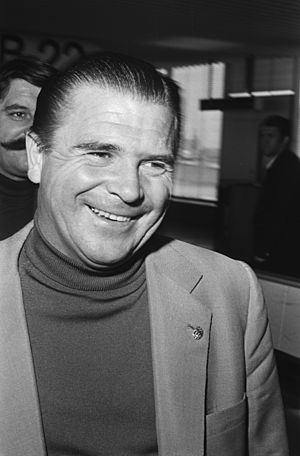
The Hungarian team of the 1950s was incredibly special. They were known as the "Aranycsapat" (which means "Golden Team") or the "Magnificent Magyars." This team changed how football was played with new tactics and amazing skills. They had legendary players like Ferenc Puskás, Sándor Kocsis, József Bozsik, and Nándor Hidegkuti.
This "Golden Team" had an incredible record: from May 1950 until February 1956, they won 43 games, drew 6, and didn't lose any, except for one very important match.
Olympic Gold Medal (1952)
At the 1952 Summer Olympics in Helsinki, Hungary was unstoppable. They beat Romania, Italy, Turkey, and Sweden (who were the champions from 1948). In the final, Hungary beat Yugoslavia 2–0, with goals from Puskás and Czibor. This was Hungary's first-ever Olympic football title!
The "Match of the Century" (1953)

On 25 November 1953, a famous match took place between England and Hungary at Wembley Stadium in London. England had not lost a home game for 90 years! In front of 105,000 fans, Nándor Hidegkuti scored for Hungary in the very first minute. Hungary led 4–2 at halftime. They scored two more goals in the second half, ending the game with an incredible 6–3 victory. This match is still called "the match of the century" in Hungary.
Just a few months later, on 23 May 1954, Hungary beat England again, this time 7–1, at the Puskás Ferenc Stadium in Hungary. This is still England's worst defeat ever! People in Hungary used to say, "The English came for a week and went home with seven one" (meaning 7-1).
The 1954 World Cup Final
The 1954 FIFA World Cup was held in Switzerland. Hungary started strong, beating South Korea 9–0 and West Germany 8–3 in the group stage. In the quarter-finals, they beat Brazil 4–2. In the semi-finals, they faced Uruguay, who had won the World Cup twice, and Hungary won 4–2 after extra time.
Then came the final. Hungary played West Germany again, the team they had beaten 8–3 earlier. Even though Hungary took an early 2–0 lead, West Germany came back to win 3–2. This game is famously known as "The Miracle of Bern" for the Germans. It was a heartbreaking loss for the "Golden Team."
Hungary was supposed to play in the 1956 Summer Olympics, but they didn't enter the tournament.
In the 1958 FIFA World Cup in Sweden, Hungary drew with Wales (1–1) and lost to Sweden (2–1). They beat Mexico (4–0), but then lost a play-off game to Wales, which meant they were out. If goal difference had been used, Hungary would have gone through!
The 1960s: More Olympic Success
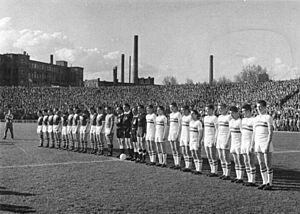
Hungary played in the 1960 Summer Olympics in Italy. They won all their group games, but then lost to Denmark in the semi-finals. However, they beat Italy 2–1 in the bronze medal match, winning a bronze medal!
1962 World Cup and European Championship
Hungary qualified for the 1962 FIFA World Cup in Chile. They had a great start, beating England 2–1 and Bulgaria 6–1. They drew 0–0 with Argentina and won their group. But in the quarter-finals, they were knocked out by Czechoslovakia, losing 1–0.
In 1964, Hungary qualified for the 1964 European Nations' Cup in Spain. They lost to Spain 2–1 in the semi-finals after extra time. However, they won the third-place play-off against Denmark 3–1, with Dezső Novák scoring two goals in extra time.
Another Olympic Gold (1964)
Hungary also qualified for the 1964 Summer Olympics in Tokyo. They won their group easily. In the quarter-finals, they beat Romania 2–0. In the semi-finals, they crushed United Arab Republic (Egypt) 6–0, with Ferenc Bene scoring four goals! In the final, Hungary beat Czechoslovakia 2–1, winning their second Olympic gold medal.
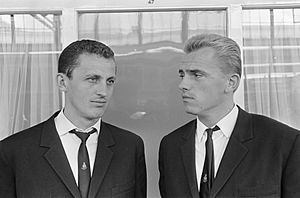
Hungary also made it to the 1966 FIFA World Cup in England. They lost their first game to Portugal 3–1. But then, they had a fantastic win against Brazil (3–1) and beat Bulgaria (3–1). They finished second in their group and reached the quarter-finals, where they lost 2–1 to the Soviet Union.
Third Olympic Gold (1968)
In the 1968 Summer Olympics, Hungary defended their title. They won their group and advanced to the quarter-finals, where they beat Guatemala 1–0. In the semi-finals, they beat Japan 5–0. In the final, they beat Bulgaria 4–1, winning their third Olympic title! This made them the most successful team in Olympic football history.
Flórián Albert was a huge star. He was named European Footballer of the Year in 1967, which is a very big award. He scored 255 goals for his club team, Ferencváros.
The 1970s: A Decline Begins
Hungary returned as champions for the 1972 Summer Olympics in Munich. They reached the final but lost 2–1 to Poland, taking home a silver medal.
Hungary also qualified for the finals of the UEFA Euro 1972 in Belgium. They lost to the Soviet Union in the semi-finals (1–0) and then lost the third-place play-off to Belgium (2–1). Hungary finished fourth in the tournament.
Hungary played in the 1978 FIFA World Cup in Argentina. They lost all three of their group matches: 2–1 to Argentina, 3–1 to Italy, and 3–1 to France. This meant they were out of the World Cup.
The 1980s: Last World Cup Appearances
Hungary qualified for the FIFA World Cup twice in the 1980s.
1982 World Cup in Spain
In the 1982 FIFA World Cup in Spain, Hungary had an amazing start! They beat El Salvador 10–1. This was a huge win, with Kiss scoring three goals. However, in their next game, they lost 4–1 to Maradona's Argentina. Even though they drew their last match against Belgium, Hungary was eliminated from the World Cup.
1986 World Cup in Mexico
Hungary's last World Cup appearance was in the 1986 FIFA World Cup in Mexico. They lost their first game 6–0 to the Soviet Union. Many football experts say this match marked the start of a difficult period for Hungarian football. Hungary did win their second match against Canada 2–0, but then lost 3–0 to Platini's France in their last group game. This was the last time the Hungarian national team played in a World Cup.
The 1990s: Tough Times
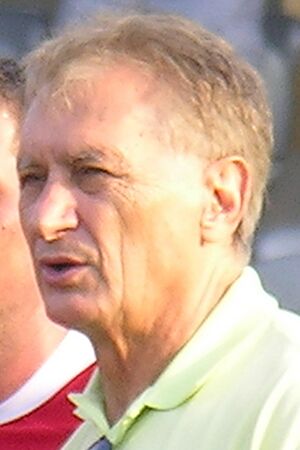
The 1990s were very challenging for Hungarian football. The team didn't qualify for any major international tournaments except for the 1996 Summer Olympics in the United States. In 1996, Hungary's FIFA ranking (which shows how good a team is compared to others) dropped to its lowest ever, 87th place.
When the Communist government ended in Hungary, many football clubs faced serious money problems. Famous clubs like Ferencváros and Újpest struggled financially. This affected the national team because these big clubs used to produce most of the national players. Also, a new rule called the "Bosman ruling" meant that players could move more easily to richer clubs in Western Europe, making it harder for Hungarian clubs to keep their best players.
Even the legendary Ferenc Puskás was appointed as the coach in 1993 to try and bring back success, but he only coached for four matches, and things didn't change much.
The only real bright spot in the 1990s was the qualification for the 1996 Summer Olympics. Dunai's young team played against Nigeria (lost 1–0), Brazil (lost 3–1), and Japan (lost 3–2). Even though they lost all their games, qualifying for the Olympics was a big surprise and gave people hope for the future. However, the team didn't achieve similar success later.
Hungary came closest to qualifying for the 1998 FIFA World Cup but lost in the play-offs to FR Yugoslavia.
The 2000s: Searching for Success
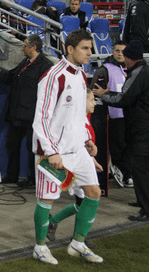
In the 2000s, two of the most talented Hungarian players were Gera and Dárdai. Both played for big clubs in other countries. However, not enough other strong players came forward to build a powerful national team. Because of this, Hungary failed to qualify for any major international tournaments throughout the 2000s, including the UEFA Euro in 2000, 2004, 2008, and the FIFA World Cup in 2002, 2006, and 2010.
During the Euro 2008 qualifiers, Hungary even lost to Malta, which was a very low point. They tried different coaches, including foreign ones like Matthäus and Koeman, but none could lead the team to a major tournament.
The only real success in this decade came from the Hungary U-20 team, which won a bronze medal at the 2009 FIFA U-20 World Cup in Egypt. Many of these young talents were quickly signed by foreign clubs, but it was unclear if they would become strong enough for the senior national team.
The 2010s: A Return to the Euros
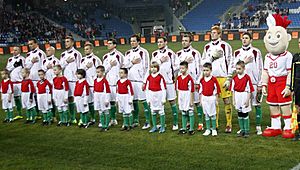
Euro 2012 Qualifying
In the Euro 2012 qualifying, Hungary was in a tough group. They lost to Sweden but then beat Moldova and scored eight goals against San Marino. They also won an important away game against Finland. However, they lost twice to the Netherlands, who were World Cup finalists.
Despite some good wins, including beating Sweden at home, Hungary didn't qualify for Euro 2012. In September 2011, Hungary reached its highest FIFA ranking in a long time, reaching 27th place, thanks to their wins.
FIFA 2014 Qualifying
Hungary started their FIFA world cup 2014 qualifying campaign with a big 5–0 win over Andorra. They then lost to the Netherlands at home. They beat Estonia and had a good 3–1 win against Turkey. They drew with Romania and Turkey away.
However, on 6 September 2013, Hungary lost 3–0 to Romania. Then, on 11 October 2013, Hungary suffered a huge 8–1 defeat against the Netherlands, which led to coach Egervári resigning. Hungary finished third in their group and missed out on qualifying for the World Cup.
Euro 2016 Qualifying and Finals
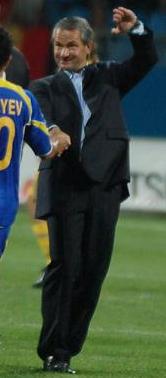
After a tough start to the Euro 2016 qualifiers, including a home loss to Northern Ireland, Storck became the coach in July 2015. Under his leadership, Hungary finally qualified for the UEFA Euro 2016! This was a huge achievement, as Hungary hadn't been in a European Championship since 1972 (44 years!). They beat Norway in a play-off, winning 1–0 away and 2–1 at home.
At the UEFA Euro 2016 finals in France, Hungary surprised everyone. They won their first group match 2–0 against Austria. Then, they drew 1–1 with Iceland and had an exciting 3–3 draw with Portugal, who had Cristiano Ronaldo! Hungary won their group and moved on to the knockout stage.
In the round of 16, Hungary played against Belgium and were eliminated. Even though they didn't go further, their performance at Euro 2016 was a big success and made fans very proud.
The 2020s: Strong Performances and New Hopes
Euro 2020 Qualification and Finals
In the UEFA Euro 2020 qualifying, Hungary finished fourth in their group. However, thanks to their performance in the 2018–19 UEFA Nations League C, they got a second chance through the play-offs. They beat Bulgaria 3–1 and then had a thrilling 2–1 win against Iceland at the new Puskás Aréna in Budapest. This meant Hungary qualified for the UEFA Euro 2020!
The UEFA Euro 2020 was held in 2021 due to the COVID-19 pandemic. Budapest was one of the host cities, and the Puskás Aréna was one of the few stadiums that allowed a full crowd. Hungary was in a very tough group with Portugal, France, and Germany.
In their first match, Hungary lost 3–0 to Portugal, but the score was 0–0 until the 84th minute! In the second match, they drew 1–1 with the 2018 World Cup winners, France, with Fiola scoring for Hungary. In their final group match against Germany in Munich, Hungary took the lead twice but eventually drew 2–2. This meant they were eliminated, but they showed amazing spirit and skill against three of the world's best teams.
UEFA Nations League Success
Under coach Marco Rossi, Hungary has had some impressive results in the UEFA Nations League.
In the 2020–21 UEFA Nations League B, Hungary surprisingly won their group, beating Turkey twice and Serbia once. This meant they were promoted to the top division, League A!
In the 2022–23 UEFA Nations League A, Hungary was in a super difficult group with Italy, England, and Germany. Despite this, Hungary finished second in the group! They even beat England twice (1–0 at home and an amazing 4–0 away!) and Germany once (1–0 away). They came very close to reaching the finals but lost to Italy in their last game.
Euro 2024 Qualification
Hungary was placed in a good position for the UEFA Euro 2024 qualifying campaign. They were drawn with Serbia, Montenegro, Bulgaria, and Lithuania.
They started strong, beating Bulgaria 3–0 at home. They drew 0–0 with Montenegro away and beat Lithuania 2–0 at home. Then, they had a fantastic 2–1 away win against Serbia.
On 16 November 2023, Hungary drew 2–2 with Bulgaria, with an own goal in the 97th minute securing the draw. This result meant Hungary qualified directly for the UEFA Euro 2024 finals! It was the first time Hungary had qualified directly for a major tournament since 1976, showing a great return to form for the national team.
Images for kids
-
Varga, Vanczák and Lewandowski in a friendly match against Poland in 2011.


